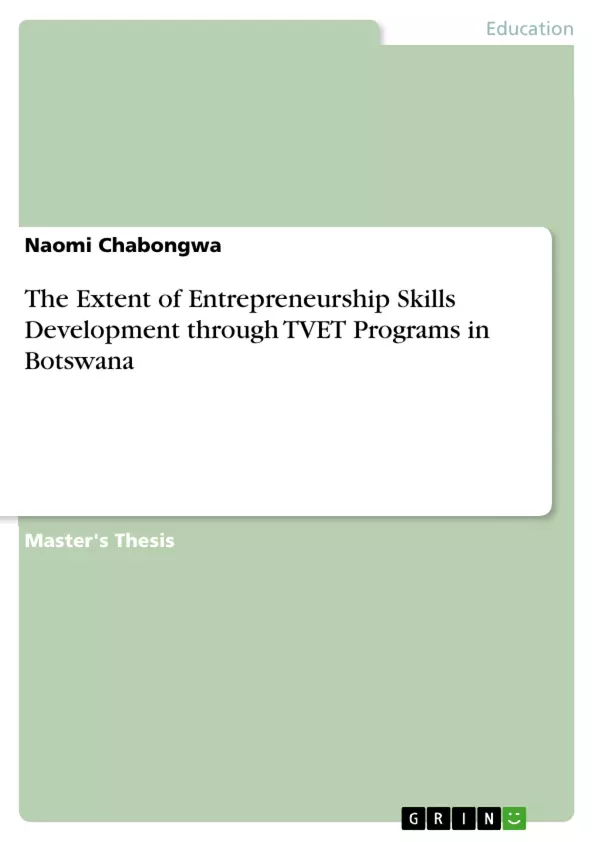The aim of this dissertation was to investigate the extent of entrepreneurship skills development through TVET programs in Botswana at FCTVE as a technical college. To attain this work, inductive method was used. Representative sample of graduates for the class of 2008-2015 were used as subjects of the research. Open ended interviews were used as a method of data collection. Looking at the investigation of the study, the training of entrepreneurship could immensely contribute in allowing graduates to have business skills and competencies that could be more important in identifying business opportunities and operate their own businesses. Furthermore, the training of entrepreneurship has not yet been considered by the government since it can bring positive results on graduates on self-employment as a career development. By utilizing qualitative approach the research adopted open ended interviews as a method of collecting data. Data saturation was arrived at 22 graduates from 2008-2015 for Francistown Technical college graduates who were purposively sampled.
The research found that the TVET graduates do not have passion about entrepreneurship since they are not interested in being employers but rather they want to be employees. Participants stated challenges for entrepreneurship and these included lack of funds as well as institutions and stakeholders failing to work together in order to produce quality entrepreneurs. Strategies that were suggested during the study include: review of the curriculum content and training instructors so that TVET could have enough number of personnel teaching entrepreneurship. The study also found that TVET graduates are not able to start their own businesses due to lack of capital. It was recommended that the Botswana Government should be seen supporting graduates by developing funding strategies that can give graduates the opportunity to apply their skills. The findings further revealed that TVET graduates are not experienced and they do not have the skills to operate their businesses and some hesitate since they do not want to be risk takers.
Inhaltsverzeichnis (Table of Contents)
- CHAPTER ONE: INTRODUCTION AND BACKGROUND TO THE PROBLEM
- 1.1 Introduction
- 1.2 Background Statement
- 1.3 Problem Statement
- 1.4 Purpose of the study
- 1.5 Objectives of the study
- 1.6 Research questions of the study
- 1.7 Significance of the study
- 1.8 Delimitations of the study
- 1.9 Chapter outline
- 1.10 Chapter summary
- CHAPTER TWO: LITERATURE REVIEW
- 2.1 Introduction
- 2.2 Introduction to the entrepreneurship concept
- 2.3 Entrepreneurship training
- 2.4 Entrepreneurship development initiatives
- 2.5 Overview of TVET program
- 2.6 Challenges of TVET
- 2.7 Entrepreneurship skills
- 2.8 Significance of entrepreneurship
- 2.9 Entrepreneurship education in vocational training programs
- 2.10 Skills for employability programs
- 2.11 Entrepreneurship competencies and attributes
- 2.12 Chapter summary
- CHAPTER THREE: RESEARCH METHODOLOGY
- 3.1 Introduction
- 3.2 Research Paradigm
- 3.3 Research design
Zielsetzung und Themenschwerpunkte (Objectives and Key Themes)
This dissertation aims to assess the extent of entrepreneurship skills development within TVET programs in Botswana, specifically at Francistown Technical College (FCTVE). The research investigates how well these programs equip graduates with the necessary skills and competencies to start and manage their own businesses.
- The development and effectiveness of entrepreneurship skills training within TVET programs.
- The challenges faced by TVET graduates in pursuing entrepreneurial ventures.
- The role of the government and other stakeholders in supporting entrepreneurial endeavors by TVET graduates.
- The perceptions of TVET graduates regarding entrepreneurship as a career path.
- The identification of potential strategies for enhancing entrepreneurship skills development within TVET programs.
Zusammenfassung der Kapitel (Chapter Summaries)
Chapter One provides a comprehensive introduction to the research, outlining the problem statement, purpose, objectives, and significance of the study. It delves into the background of TVET programs in Botswana and the growing need for entrepreneurship skills development.
Chapter Two presents a detailed literature review, exploring the concept of entrepreneurship, entrepreneurship training, and various initiatives designed to foster entrepreneurial development. It examines the specific challenges faced by TVET programs in Botswana and explores the importance of entrepreneurship skills in the context of vocational training.
Chapter Three focuses on the research methodology employed in the study. It outlines the research paradigm, design, and data collection methods used to gather information about the extent of entrepreneurship skills development within TVET programs.
Schlüsselwörter (Keywords)
The dissertation centers around the core concepts of entrepreneurship skills development, TVET programs, graduate employability, and entrepreneurial challenges within the context of Botswana's education system. The research investigates the effectiveness of TVET programs in preparing graduates for entrepreneurial endeavors, explores the barriers to self-employment, and proposes potential strategies for enhancing the development of entrepreneurial competencies.
- Quote paper
- Masters of Commerce in Tourism and Hospitality Management Naomi Chabongwa (Author), 2018, The Extent of Entrepreneurship Skills Development through TVET Programs in Botswana, Munich, GRIN Verlag, https://www.grin.com/document/427027



